人教版(2019)必修第三册Unit 4 Space Exploration Listening and Speaking课件(共18张PPT)
文档属性
| 名称 | 人教版(2019)必修第三册Unit 4 Space Exploration Listening and Speaking课件(共18张PPT) | 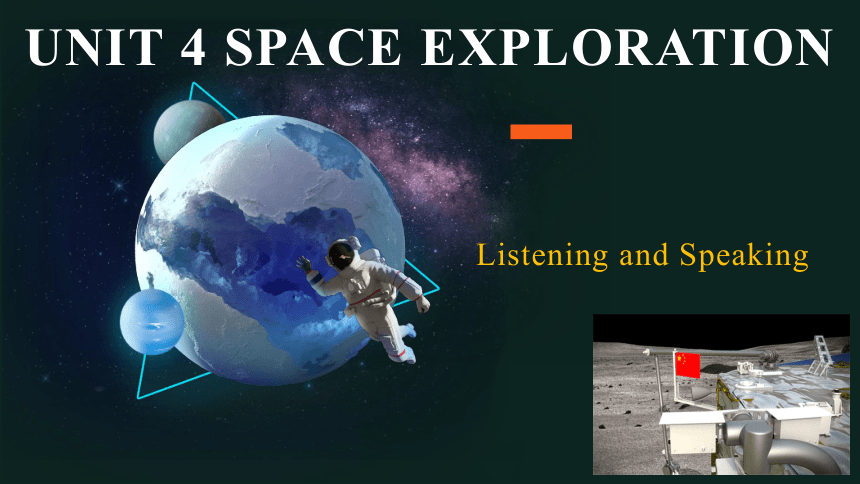 | |
| 格式 | pptx | ||
| 文件大小 | 23.2MB | ||
| 资源类型 | 教案 | ||
| 版本资源 | 人教版(2019) | ||
| 科目 | 英语 | ||
| 更新时间 | 2024-03-19 09:22:18 | ||
图片预览

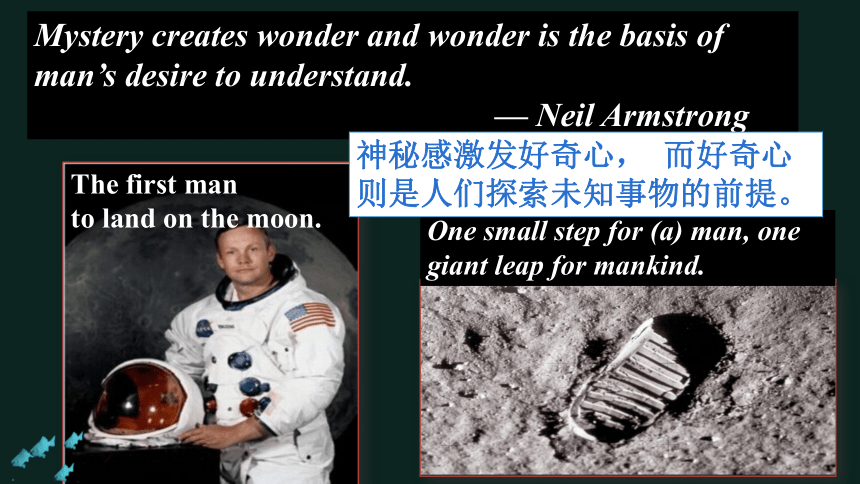
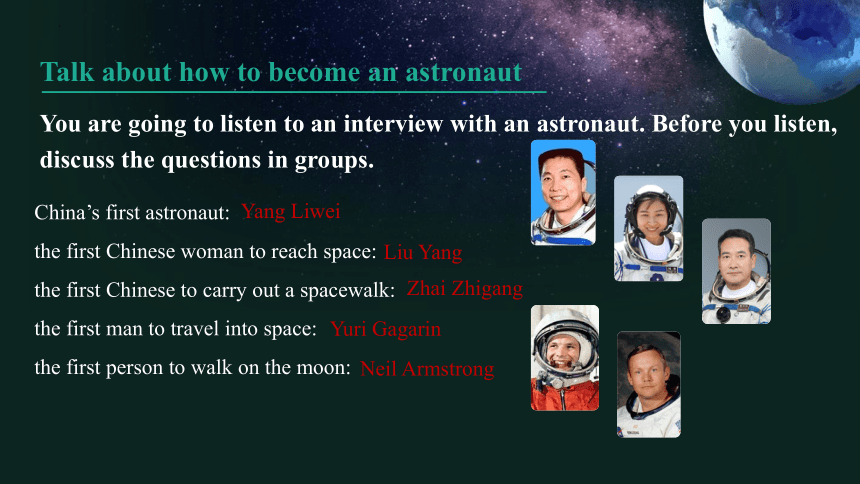
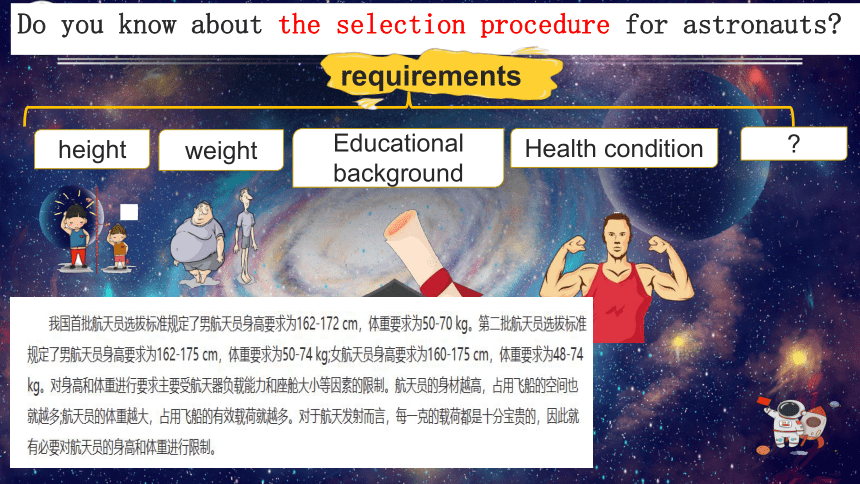
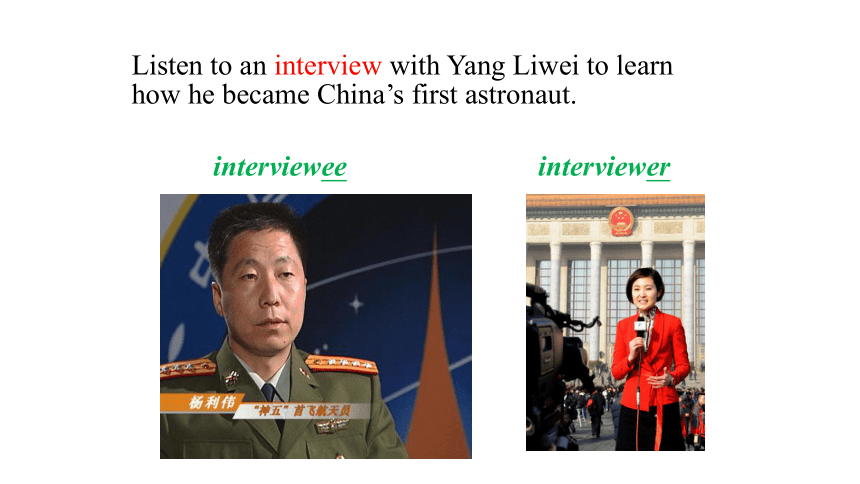
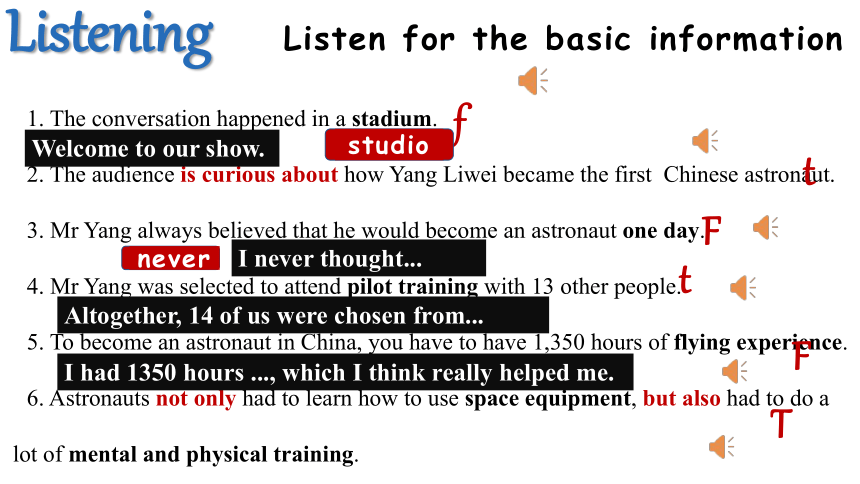
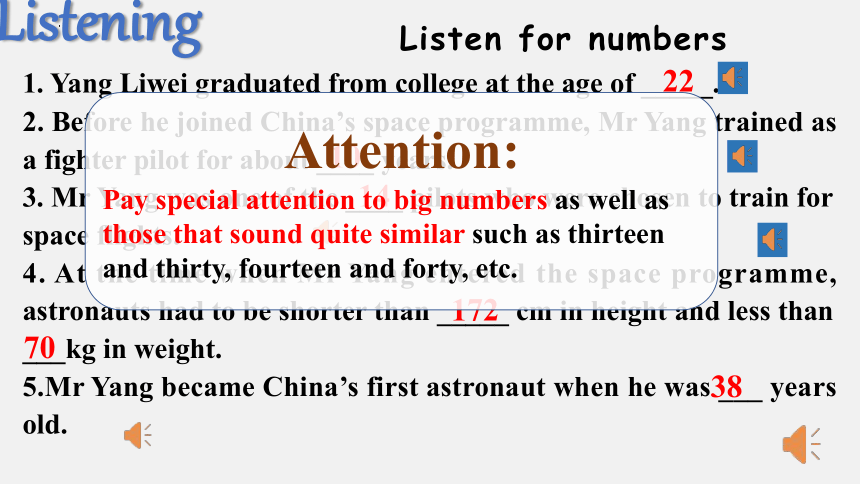
文档简介
(共18张PPT)
UNIT 4 SPACE EXPLORATION
Listening and Speaking
Mystery creates wonder and wonder is the basis of man’s desire to understand.
— Neil Armstrong
One small step for (a) man, one giant leap for mankind.
The first man
to land on the moon.
神秘感激发好奇心, 而好奇心
则是人们探索未知事物的前提。
Talk about how to become an astronaut
You are going to listen to an interview with an astronaut. Before you listen, discuss the questions in groups.
China’s first astronaut:
the first Chinese woman to reach space:
the first Chinese to carry out a spacewalk:
the first man to travel into space:
the first person to walk on the moon:
Yang Liwei
Liu Yang
Zhai Zhigang
Yuri Gagarin
Neil Armstrong
Do you know about the selection procedure for astronauts
requirements
height
weight
Educational background
Health condition
Listen to an interview with Yang Liwei to learn how he became China’s first astronaut.
interviewer
interviewee
Listening
Listen for the basic information
1. The conversation happened in a stadium.
2. The audience is curious about how Yang Liwei became the first Chinese astronaut.
3. Mr Yang always believed that he would become an astronaut one day.
4. Mr Yang was selected to attend pilot training with 13 other people.
5. To become an astronaut in China, you have to have 1,350 hours of flying experience.
6. Astronauts not only had to learn how to use space equipment, but also had to do a lot of mental and physical training.
f
studio
Welcome to our show.
t
F
never
I never thought...
t
Altogether, 14 of us were chosen from...
F
I had 1350 hours ..., which I think really helped me.
T
1. Yang Liwei graduated from college at the age of _____.
2. Before he joined China’s space programme, Mr Yang trained as a fighter pilot for about ____ years.
3. Mr Yang was one of the ____ pilots who were chosen to train for space flights.
4. At the time when Mr Yang entered the space programme, astronauts had to be shorter than _____ cm in height and less than ___kg in weight.
5.Mr Yang became China’s first astronaut when he was ___ years old.
22
10
14
70
172
38
Attention:
Pay special attention to big numbers as well as those that sound quite similar such as thirteen and thirty, fourteen and forty, etc.
Listening
Listen for numbers
Listen for numbers
thirty
thirteen
128:
2,345:
1886543(telephone number):
/'θ t /
/θ 'ti n/
two thousand three hundred and forty five
one hundred and twenty eight
one double eight six five four three
Number questions are typically related to:
9:20
nine twenty
time, telephone numbers, heights, weights, age...
2. Try to make a list of the requirements for becoming an astronaut.
Education background: ________ degree, trained to be _____________
Experience: enough hours of _______ experience
Health condition: must be in perfect __________________
Courses: __________,___________and____________
Special training: Practice using ___________________ , and do a lot of ______________________training
astronomy
science
English
health and shape
flight
space equipment
mental and physical
a fighter pilot
College
Interviewer: Today we are very pleased to chat with Mr. Yang Liwei, the first Chinese astronaut. Welcome to the show, Mr. Yang.
Mr Yang: Thank you.
Interviewer: Mr. Yang, our audience is very curious about how you succeeded in becoming China’s first astronaut. It must have been a very difficult thing to achieve. Did you always want to be an astronaut
Mr Yang: Yes, I dreamt of it when I was young, but I never thought my wish would come true. It took a long time. First, I got my college
degree when I was 22, and then I worked as a fighter pilot for around
听力原文
10 years. I finally became China's first astronaut when I was 38 years old.
Interviewer: Oh, so you must be a really experienced pilot. Do you think that was one of the reasons why you were chosen for the space programme
Mr Yang: Sure, I had 1, 350 hours of flight experience, which I think really helped me.
Interviewer: So how difficult was it to join the space programme
Mr Yang:There was a lot of competition. Altogether, 14 of us were chosen from among 1,500 pilots to train for space flights.
Interviewer: That sounds really difficult. Did you also have to be a certain size and weight
Mr Yang:Yes, at the time, you had to be shorter than 172 centimetres in height and weigh less than 70 kilograms. You also had to be in perfect health and perfect shape.
Interviewer: So you were the perfect choice! As we all know, an astronaut needs to be healthy and calm in order to work in space. But you also had to study a lot, too, right
Mr Yang:Yes, I had to learn English, science, and astronomy. I also had to practise using space equipment, and do a lot of mental and physical training. It was very tiring, but I was so proud to have the opportunity.
Discussion
Think about the following questions and share your opinions with partners.
· Do you want to be an astronaut in the future why
· If not, what do you want to be in the future
Post-listening
EXAMPLE:
A: What do you think of being an astronaut
B: I think being an astronaut would be cool.
A: So do you want to be an astronaut in the future
B: Of course. I am eager to walk in the space. How about you
A: I think it might be too difficult for me. I want to be a teacher
in the future.
Reasons why you want to:
1. be eager [ i ɡ (r)] to(渴望) explore the universe
2. be curious about the aliens.
3. It’s exciting/honored /interesting... to be an astronaut.
4. ...
Job: doctor, nurse, reporter, scientist, policeman...
Summary
No matter whether you want to be an astronaut or not, I hope all of you can have a dream. And don’t let the challenges stop you, just go for it.
What did we learn today
Words review
astronaut
procedure
mental
cm
figher
astronomy
equipment
n. 宇航员;太空人
n. 程序;步骤;手续
adj. 精神的;思想的
abbr. (centimetre or centimeter) 厘米
n.战士,战斗机
n. 天文学
n. 设备,用具
Thank you
Thank you
UNIT 4 SPACE EXPLORATION
Listening and Speaking
Mystery creates wonder and wonder is the basis of man’s desire to understand.
— Neil Armstrong
One small step for (a) man, one giant leap for mankind.
The first man
to land on the moon.
神秘感激发好奇心, 而好奇心
则是人们探索未知事物的前提。
Talk about how to become an astronaut
You are going to listen to an interview with an astronaut. Before you listen, discuss the questions in groups.
China’s first astronaut:
the first Chinese woman to reach space:
the first Chinese to carry out a spacewalk:
the first man to travel into space:
the first person to walk on the moon:
Yang Liwei
Liu Yang
Zhai Zhigang
Yuri Gagarin
Neil Armstrong
Do you know about the selection procedure for astronauts
requirements
height
weight
Educational background
Health condition
Listen to an interview with Yang Liwei to learn how he became China’s first astronaut.
interviewer
interviewee
Listening
Listen for the basic information
1. The conversation happened in a stadium.
2. The audience is curious about how Yang Liwei became the first Chinese astronaut.
3. Mr Yang always believed that he would become an astronaut one day.
4. Mr Yang was selected to attend pilot training with 13 other people.
5. To become an astronaut in China, you have to have 1,350 hours of flying experience.
6. Astronauts not only had to learn how to use space equipment, but also had to do a lot of mental and physical training.
f
studio
Welcome to our show.
t
F
never
I never thought...
t
Altogether, 14 of us were chosen from...
F
I had 1350 hours ..., which I think really helped me.
T
1. Yang Liwei graduated from college at the age of _____.
2. Before he joined China’s space programme, Mr Yang trained as a fighter pilot for about ____ years.
3. Mr Yang was one of the ____ pilots who were chosen to train for space flights.
4. At the time when Mr Yang entered the space programme, astronauts had to be shorter than _____ cm in height and less than ___kg in weight.
5.Mr Yang became China’s first astronaut when he was ___ years old.
22
10
14
70
172
38
Attention:
Pay special attention to big numbers as well as those that sound quite similar such as thirteen and thirty, fourteen and forty, etc.
Listening
Listen for numbers
Listen for numbers
thirty
thirteen
128:
2,345:
1886543(telephone number):
/'θ t /
/θ 'ti n/
two thousand three hundred and forty five
one hundred and twenty eight
one double eight six five four three
Number questions are typically related to:
9:20
nine twenty
time, telephone numbers, heights, weights, age...
2. Try to make a list of the requirements for becoming an astronaut.
Education background: ________ degree, trained to be _____________
Experience: enough hours of _______ experience
Health condition: must be in perfect __________________
Courses: __________,___________and____________
Special training: Practice using ___________________ , and do a lot of ______________________training
astronomy
science
English
health and shape
flight
space equipment
mental and physical
a fighter pilot
College
Interviewer: Today we are very pleased to chat with Mr. Yang Liwei, the first Chinese astronaut. Welcome to the show, Mr. Yang.
Mr Yang: Thank you.
Interviewer: Mr. Yang, our audience is very curious about how you succeeded in becoming China’s first astronaut. It must have been a very difficult thing to achieve. Did you always want to be an astronaut
Mr Yang: Yes, I dreamt of it when I was young, but I never thought my wish would come true. It took a long time. First, I got my college
degree when I was 22, and then I worked as a fighter pilot for around
听力原文
10 years. I finally became China's first astronaut when I was 38 years old.
Interviewer: Oh, so you must be a really experienced pilot. Do you think that was one of the reasons why you were chosen for the space programme
Mr Yang: Sure, I had 1, 350 hours of flight experience, which I think really helped me.
Interviewer: So how difficult was it to join the space programme
Mr Yang:There was a lot of competition. Altogether, 14 of us were chosen from among 1,500 pilots to train for space flights.
Interviewer: That sounds really difficult. Did you also have to be a certain size and weight
Mr Yang:Yes, at the time, you had to be shorter than 172 centimetres in height and weigh less than 70 kilograms. You also had to be in perfect health and perfect shape.
Interviewer: So you were the perfect choice! As we all know, an astronaut needs to be healthy and calm in order to work in space. But you also had to study a lot, too, right
Mr Yang:Yes, I had to learn English, science, and astronomy. I also had to practise using space equipment, and do a lot of mental and physical training. It was very tiring, but I was so proud to have the opportunity.
Discussion
Think about the following questions and share your opinions with partners.
· Do you want to be an astronaut in the future why
· If not, what do you want to be in the future
Post-listening
EXAMPLE:
A: What do you think of being an astronaut
B: I think being an astronaut would be cool.
A: So do you want to be an astronaut in the future
B: Of course. I am eager to walk in the space. How about you
A: I think it might be too difficult for me. I want to be a teacher
in the future.
Reasons why you want to:
1. be eager [ i ɡ (r)] to(渴望) explore the universe
2. be curious about the aliens.
3. It’s exciting/honored /interesting... to be an astronaut.
4. ...
Job: doctor, nurse, reporter, scientist, policeman...
Summary
No matter whether you want to be an astronaut or not, I hope all of you can have a dream. And don’t let the challenges stop you, just go for it.
What did we learn today
Words review
astronaut
procedure
mental
cm
figher
astronomy
equipment
n. 宇航员;太空人
n. 程序;步骤;手续
adj. 精神的;思想的
abbr. (centimetre or centimeter) 厘米
n.战士,战斗机
n. 天文学
n. 设备,用具
Thank you
Thank you
